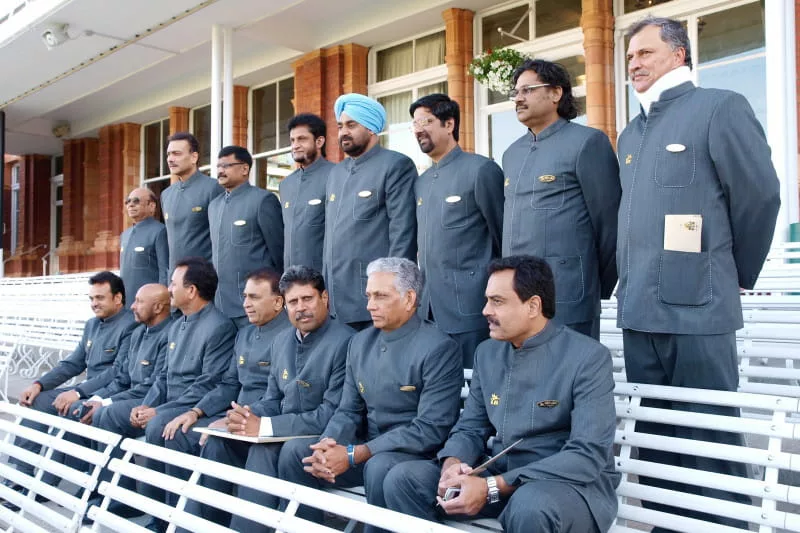On June 25, 1983, India achieved a historic milestone by winning the Cricket World Cup for the first time. While it may not appear surprising in today’s context, back then, it was a remarkable sporting upset that left a lasting impact on both the champions and the sport as a whole.
Kapil Dev’s team was considered the underdogs in the final, facing a formidable West Indies side. However, they defied the odds and emerged victorious, claiming the coveted trophy.
India, a nation that had only won the World Cup once before, embarked on a remarkable journey to Lord’s. They finished second in Group B and secured their place in the final after defeating the host nation, England, in the semi-finals.
However, few anticipated they would outshine the West Indies, who had previously been crowned champions in 1975 and 1979. This victory not only marked a significant turning point in Indian cricket history but also had a profound impact on the one-day format of the sport in India, a nation known for its deep passion for cricket. The unexpected success of the Indian team became a source of inspiration for the entire country.
As we commemorate the anniversary of India’s historic triumph, let us look at 20 other memorable surprises in the history of the Cricket World Cup.
20. Sri Lanka vs. India (Old Trafford, 1979)
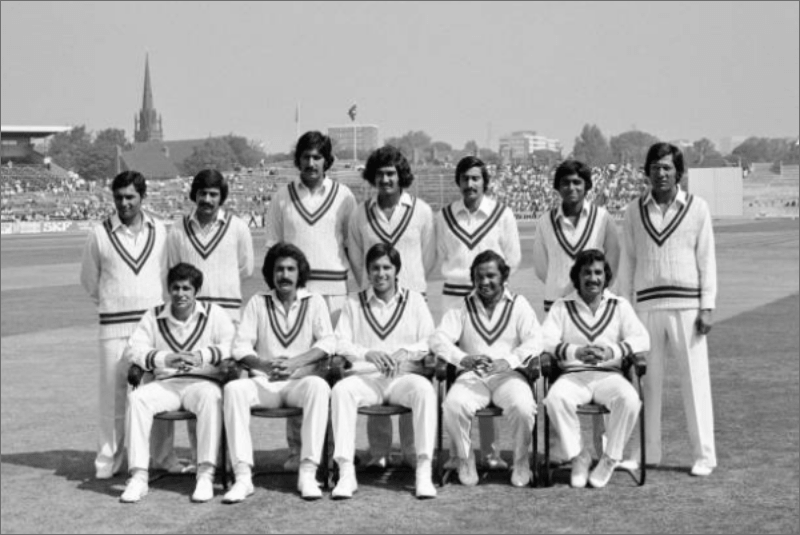
Before the historic win in 1983, India’s performance in the Cricket World Cup had been rather dismal. In the first two editions of the tournament, they failed to progress beyond the group stage. One particularly noteworthy, albeit regrettable, moment was Sunil Gavaskar’s excruciatingly slow innings in 1975 when he scored only 36 runs from 174 balls against England at Lord’s.
India’s misfortunes continued in the 1979 World Cup when they faced Sri Lanka, still an Associate nation. The match took place at Old Trafford in Manchester, England. Sri Lanka managed to post a competitive total of 238 for six from their allotted 60 overs, with Sunil Wettimuny, Roy Dias, and Duleep Mendis contributing half-centuries.
The game started on a Saturday, but India’s run chase was delayed until Monday, which did not work in their favor. They were eventually bowled out for 191 runs in 54.1 overs. As a result, India finished at the bottom of Group B, having previously suffered heavy defeats against West Indies and New Zealand.
This period of underperformance highlighted the significant contrast with their triumphant campaign in 1983, which marked a turning point in India’s cricketing history.
19. Australia vs. South Africa (Edgbaston, 1999)
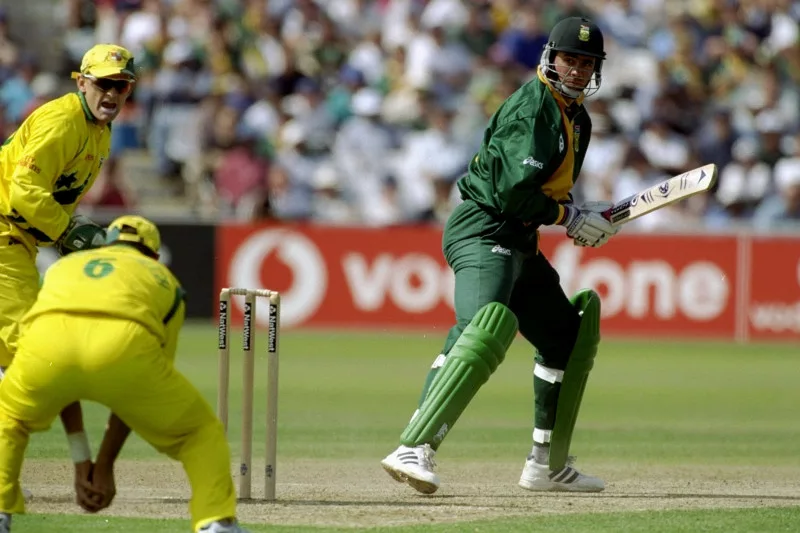
The outcome of Australia defeating South Africa in the 1999 Cricket World Cup semi-final may not have been a surprise, given Australia’s cricketing prowess. However, how they secured their victory was nothing short of stunning.
In a thrilling, back-and-forth contest at Edgbaston in Birmingham, England, the momentum favored South Africa as Lance Klusener’s blistering performance brought them close to victory. In response to Australia’s total of 213, South Africa had stumbled to 176 for six, but Klusener’s explosive batting changed the game’s dynamics.
In a remarkable display, he smashed 31 runs off just 14 deliveries, leaving his team needing only one more run from the last four balls of the match to secure the win. However, in a shocking turn of events, confusion between Klusener and the Last Man, Allan Donald, after Klusener’s drive led to Donald being run out.
The match ended in a dramatic tie, and Australia progressed to the final due to a higher net run rate in the Super Six table, which they had finished ahead of South Africa. Tim de Lisle aptly described it in his report for the Wisden Almanack, “It was a close epic all the way through, and it ended in a savage twist.”
18. Kenya vs. Zimbabwe (Bloemfontein, 2003)
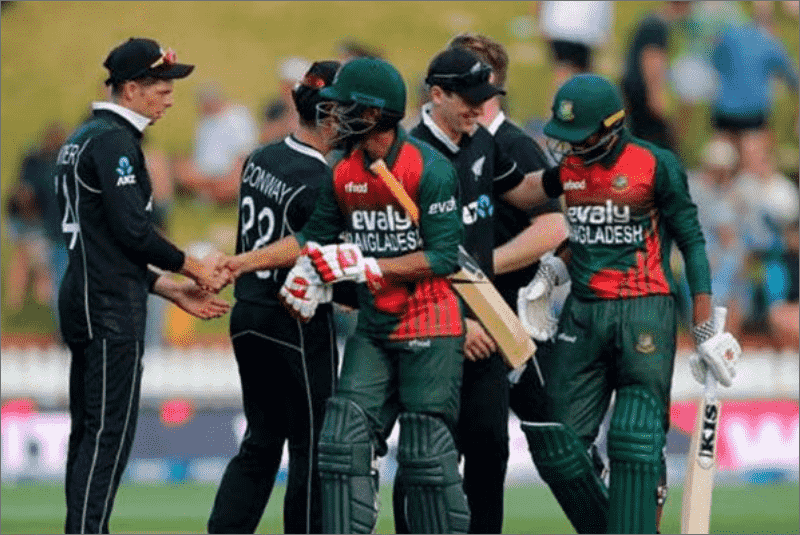
Kenya’s remarkable journey in the 2003 Cricket World Cup took them to the semi-final stage, with one of the most memorable moments being their victory over Zimbabwe, a team they had historically struggled against.
In the Super Six fixture, Zimbabwe’s batting faltered, scoring just 133 runs before being dismissed. Andy Flower was the only resistance, contributing 63 runs to their total. Kenya’s Martin Suji played a pivotal role by taking three wickets for just 19 runs, dismantling Zimbabwe’s top order. Leg-spinner Collins Obuya also made a significant impact, picking up three wickets.
Kenya’s run chase began with a challenge, as they found themselves at 62 for three. However, Thomas Odoyo and Maurice Odumbe stepped up with an outstanding partnership. They combined for an unbroken 73-run stand, guiding their nation to victory with a comfortable 144 balls to spare.
This triumph was Kenya’s third victory over a Test-playing nation in the tournament, a significant achievement that propelled them into the semi-finals. Unfortunately, their journey ended in the next round when they faced India.
17. New Zealand vs. Australia (Auckland, 1992)

Despite being the pre-tournament favorites in the 1992 Cricket World Cup, Australia’s flaws were exposed in just one game. Co-hosts New Zealand, with home advantage in the trans-Tasman battle in Auckland, had not only a batsman in the form of Martin Crowe but also a captain who thought outside the box.
New Zealand’s innings began shakily at 53 for three, but Crowe, who finished unbeaten on 100, and Ken Rutherford added 118 runs for the fourth wicket, taking their total to 248 for six.
The Kiwis surprised everyone with their opening bowling combination, using spinner Dipak Patel alongside seamer Chris Cairns. This tactic paid off as Patel picked up one wicket for 36 runs in his ten overs, and Australia struggled to maintain the required run rate.
While David Boon scored a century, his dismissal triggered a late collapse. The Australian innings crumbled to 211 runs, marking the start of a disappointing campaign that saw them fail to reach the semi-finals.
In contrast, New Zealand advanced to the last four, only to face an upset against eventual champions Pakistan.
16. Ireland vs. West Indies (Nelson, 2015)
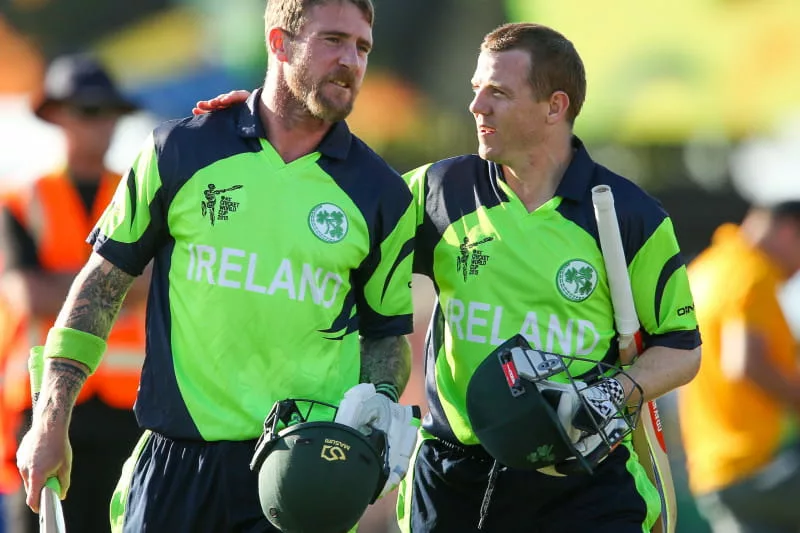
In their opening match of the 2015 campaign in Nelson, New Zealand, Ireland secured a noteworthy four-wicket victory over West Indies. Despite the comeback by the West Indies, Ireland’s captain, William Porterfield, emphasized that their win was not upset.
West Indies had stumbled to 87 for five before recovering to post 304 for seven, with Lendl Simmons leading the revival with a century. However, any concerns Irish fans had about letting West Indies off the hook quickly vanished.
Paul Stirling (92) and Ed Joyce (84) played crucial roles in Ireland’s run chase, and Niall O’Brien’s unbeaten 79 ensured they reached their target with an impressive 25 balls to spare.
This victory marked another historic moment for the Associate nation, and Porterfield, as reported by the Jamaica Observer, argued that no one should be surprised, saying, “The term an upset, anything from minnows to Associate, I do not see why a team has to be an Associate or a team has to be a full member.”
15. England vs. India (Bombay, 1987)
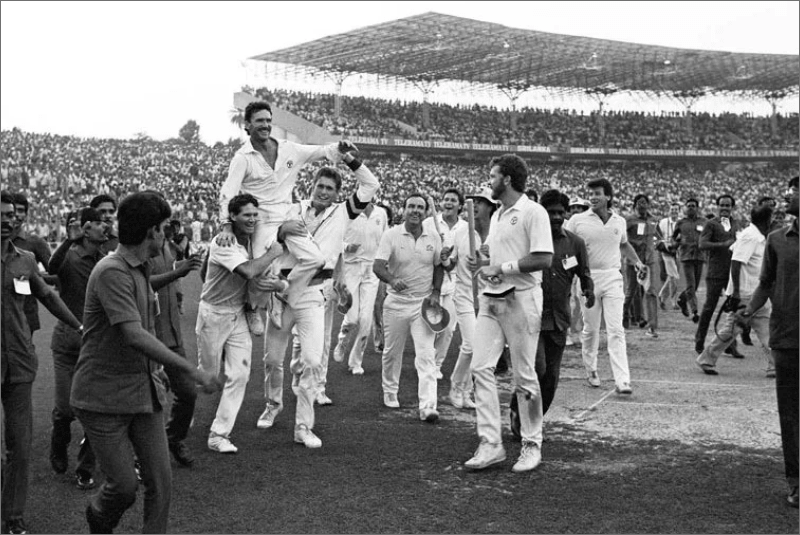
After their historic Cricket World Cup win in 1983, India’s enthusiasm for 50-over cricket grew significantly. They had the opportunity to host the next tournament in 1987, and with favorable conditions and the unwavering support of their cricket-loving nation, they were considered strong contenders.
In the semi-finals, India faced England, a team well-acquainted with the pressure of trying to win the tournament on home soil. England batted first, and Graham Gooch’s remarkable century, featuring sweeping and pulling, was a standout performance.
He formed a vital partnership of 117 runs with skipper Mike Gatting, who contributed 56, helping England post a competitive total of 254 for six.
India’s chase began with the early loss of Sunil Gavaskar, but Mohammad Azharuddin’s innings of 64 kept them on course. However, once Azharuddin was dismissed with a score of 204, the hosts suffered a dramatic collapse.
They lost their last five wickets for just 15 runs, eventually being bowled out for 219 in 45.3 overs. Spinner Eddie Hemmings played a starring role, claiming four wickets for 52 runs.
England advanced to the final, but they lost to Australia in the ultimate showdown.
14. Pakistan vs. New Zealand (Auckland, 1992)
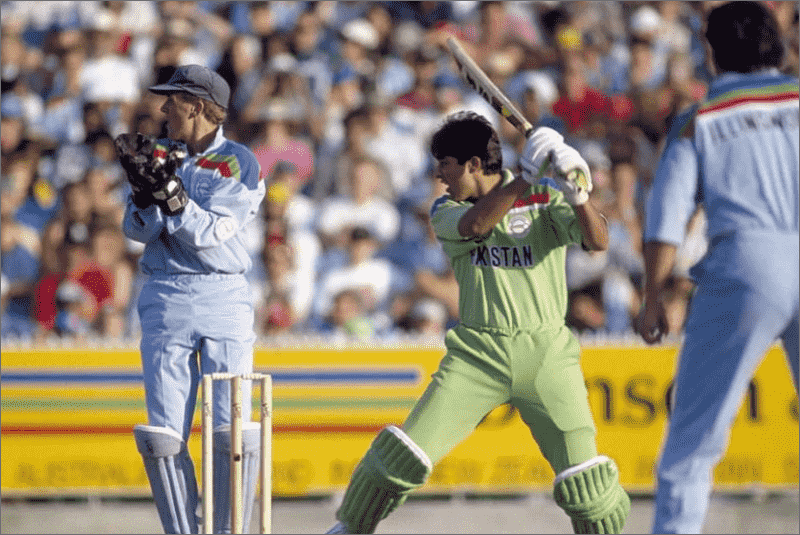
In the 1992 Cricket World Cup, Pakistan’s journey to the semi-finals was a close call. A series of late wins, along with the fortunate circumstance of a rained-off match against England when they were on the brink of losing, allowed them to secure the final qualification spot.
Despite beating New Zealand once in the tournament, the Kiwis were considered favorites to win in Auckland and advance to the final. The hosts appeared to be in a strong position as they posted 262 for seven, with captain Martin Crowe leading the charge by scoring 91 from 83 deliveries.
Although New Zealand’s skipper could not take the field due to injury, they seemed to be in control heading into the final 15 overs. However, Pakistan needed 123 runs at Eden Park, and they found a new hero in Inzamam-ul-Haq.
The young batsman played an explosive innings, scoring 60 runs from 37 balls. While he was run out in a tense finish, Moin Khan’s unbeaten 20 ensured that Pakistan reached the target with over an over to spare.
This victory propelled Pakistan to the final, where they eventually lifted the trophy by defeating England in the championship match at Melbourne.
13. Zimbabwe vs. England (Albury, 1992)

In the 1992 Cricket World Cup, Zimbabwe secured only their second World Cup victory, nearly a decade after their first win. They achieved this feat by defeating England in a low-scoring encounter at Albury, Australia.
Zimbabwe, batting first and considered the underdogs, struggled on a pitch favorable to bowlers, managing to post just 134 runs before being bowled out in the 47th over. England’s spin duo of Richard Illingworth and Phil Tufnell combined to claim five wickets, making it seem straightforward for the English batters.
However, there were early signs that things would not go as planned. Graham Gooch fell to the first ball of the innings, one of four wickets taken by Zimbabwe seamer Eddo Brandes. Despite England reaching 95 for five, they lost the remaining wickets for 30 runs, ultimately bowling out for 125.
This victory for Zimbabwe marked the end of an 18-match losing streak in World Cup matches. England reached the final, but they could not secure the tournament victory.
12. Bangladesh vs. Pakistan (Northampton, 1999)

In 1999, Bangladesh, still not granted full Test status, achieved a significant victory by toppling the mighty Pakistan. Although the match was essentially a dead rubber, with Pakistan already assured of qualifying for the semi-finals, the underdogs seized the opportunity to claim a major scalp before heading home.
Bangladesh, batting first after being put into bat at the County Ground in Northampton, England, managed to score 223 for nine in their 50 overs.
It quickly became apparent that Pakistan would face difficulties. They lost their first five wickets with just 42 runs on the board, with the run-out of opener Saeed Anwar further complicating their situation.
Pakistan’s lower order tried to recover, but they were eventually bowled out for 161 in 44.3 overs. Saqlain Mushtaq was the last wicket to fall, though by the time he was given out, Bangladesh fans had already started celebrating their remarkable victory.
11. Canada vs. Bangladesh (Kingsmead, 2003)
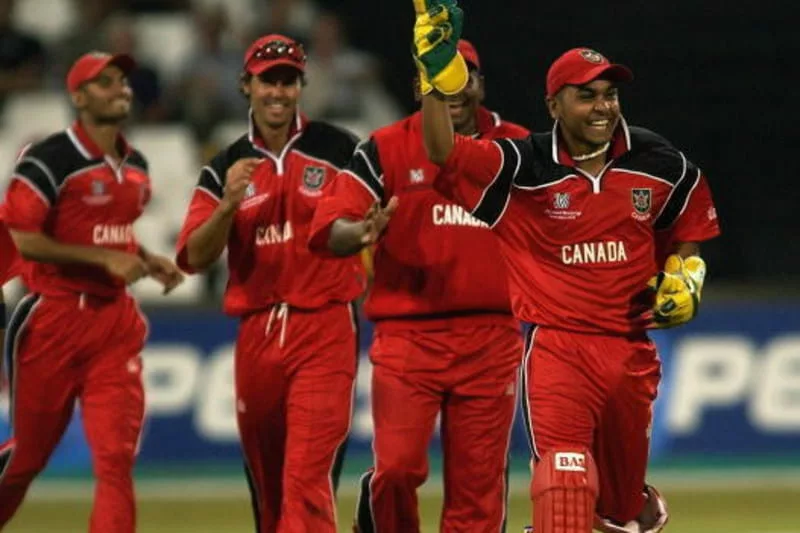
In 2007, Bangladesh, known for its occasional surprise victories, experienced an unexpected turn of events when it faced Canada.
Initially, everything appeared to go as planned for the Bangladeshi team when they bowled out Canada for just 180 at Kingsmead, Durban, South Africa. They started their batting innings well, reaching 33 without losing a wicket.
However, a sudden collapse followed, and they lost all ten wickets for the addition of only 87 runs. In their first full One-Day International (ODI) match since 1979, Canada capitalized on some careless shots by the Bangladeshi batters, eventually dismissing them for a mere 120 runs in 28 overs.
The hero for the Associate nation, Canada, was Austin Codrington, a seamer born in Portland, Jamaica. He played a crucial role by taking five wickets for just 27 runs in his nine overs. Codrington’s impressive performance included taking the last three wickets for the addition of only one run, ultimately sealing a stunning triumph when he had Mohammad Rafique caught by John Davison for 12 runs.
10. Sri Lanka vs. Australia (Lahore, 1996)
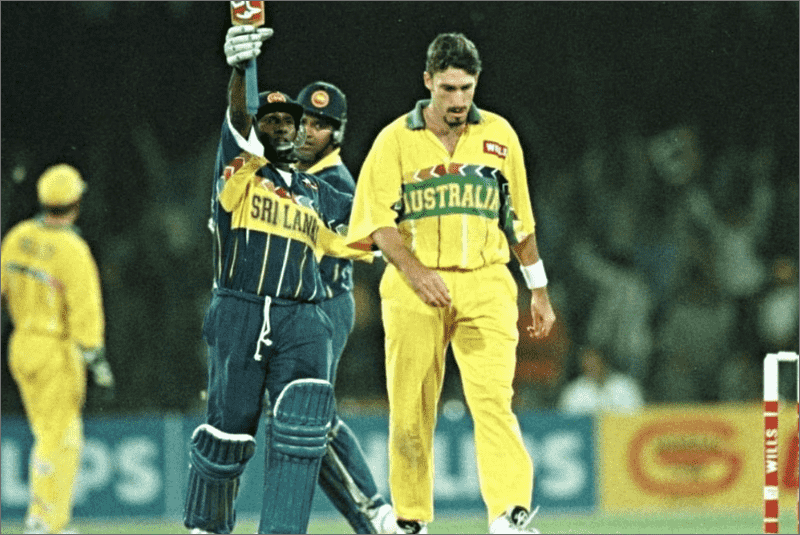
Sri Lanka’s win in the 1996 Cricket World Cup is often remembered for their reliance on spinners and an aggressive opening batting pair. However, their triumph in the final at Lahore, Pakistan, was not solely about explosive batting at the top of the order.
In pursuit of a target of 242, both Sanath Jayasuriya and Romesh Kaluwitharana were dismissed for single-digit scores. Sri Lanka, though, remained composed, knowing they had a key player in Aravinda de Silva.
The diminutive right-hander entered the fray with the score at 23 for two and went on to craft a match-winning century, finishing unbeaten on 107 in a seven-wicket victory.
Aravinda de Silva had made a significant contribution with his off-spin, claiming three crucial wickets. Sri Lanka’s skipper, Arjuna Ranatunga, was rewarded for his bold decision to bowl first after winning the toss.
Muttiah Muralitharan, who was part of the victorious team, highlighted the impact of this success, saying, “The victory reached out to future generations, demonstrating what could be achieved and paving the way for the professionalization of cricket. It put Sri Lanka cricket on the world map, and our growth has continued ever since.”
9. Bangladesh vs. India (Trinidad, 2007)
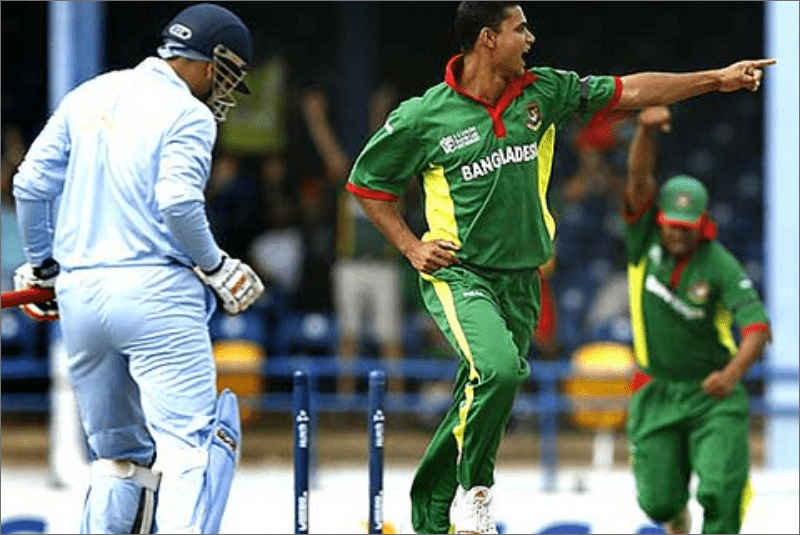
The format of the 2007 Cricket World Cup left no room for early stumbles by the top cricketing nations. The 16 participating teams were divided into four groups, with the top two advancing to the Super Eight stage.
India, initially considered a strong contender, found itself in Group B alongside Sri Lanka, Bangladesh, and Bermuda. However, in their opening match, Rahul Dravid’s team suffered a surprising setback, losing to neighboring Bangladesh by five wickets in Trinidad.
India, after opting to bat first, was bowled out for 191. The situation would have been worse if not for a patient 66 from Sourav Ganguly. Nevertheless, Bangladesh managed to chase down India’s total with five wickets to spare, and young Mushfiqur Rahim displayed great maturity by remaining unbeaten on 56.
This unexpected defeat proved costly for India, as they were shockingly eliminated from the tournament in the early stages.
8. Zimbabwe vs. India (Leicester, 1999)
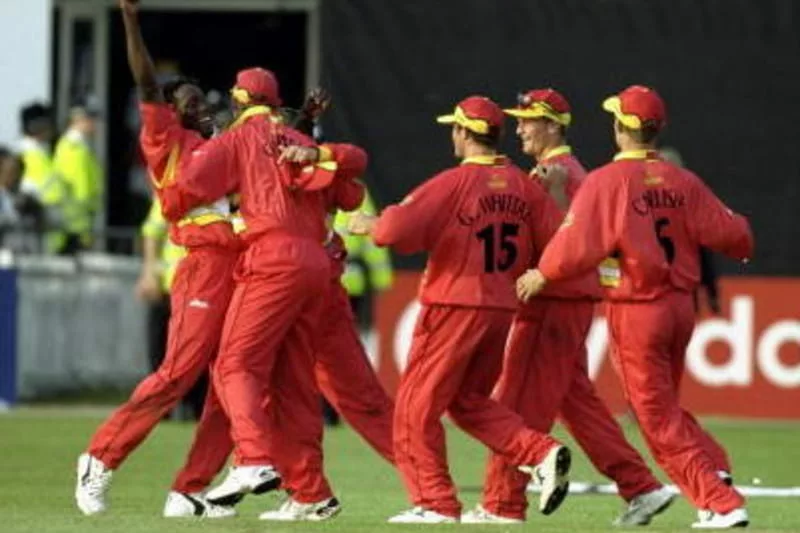
In their second match at the 1999 Cricket World Cup, Zimbabwe engineered a remarkable turnaround to snatch victory from the jaws of defeat.
India seemed poised for victory in the Group A fixture at Grace Road, Leicester, England, needing just nine runs from the final two overs. However, it was Henry Olonga who dramatically altered the course of the match.
The seamer, who had an initially disappointing spell, returned to the attack and took the final three wickets for India in the same over. Robin Singh was caught for 35, and then Javagal Srinath and Venkatesh Prasad fell in successive deliveries, leaving India all out for 249.
Earlier in the match, Andy Flower had played a crucial role for Zimbabwe, scoring an unbeaten 68. Additionally, India had been penalized four overs from their run chase due to a slow over-rate in the field. This infraction played a part in Zimbabwe’s stunning victory.
7. Zimbabwe vs. South Africa (Chelmsford, 1999)
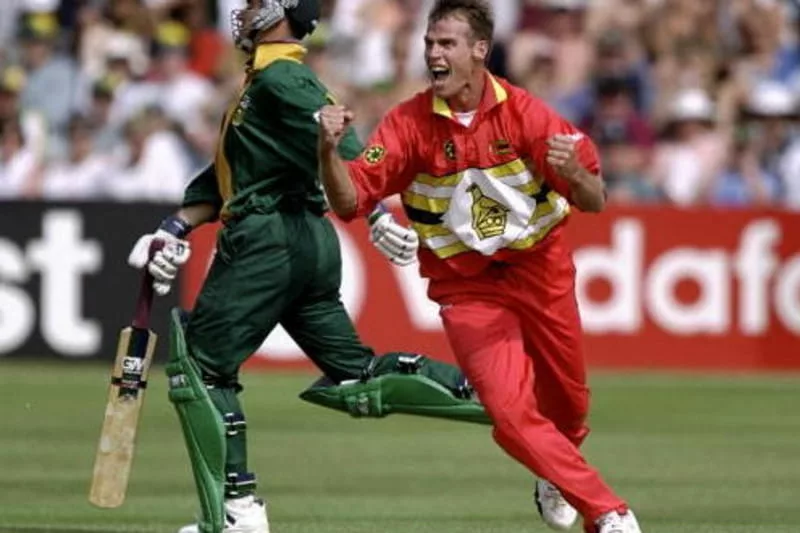
During the 1999 Cricket World Cup, all-rounder Neil Johnson emerged as the hero for Zimbabwe as they continued their surprising victories. In a match against South Africa at the County Ground in Chelmsford, England, Johnson played a pivotal role.
Johnson, who had spent part of his youth in South Africa, was the top-scorer for Zimbabwe, contributing 76 runs to help his team reach 233 for six. However, it was with the ball that he made the most significant impact.
Teaming up with new-ball partner Heath Streak, Johnson wreaked havoc on the South African top order. South Africa found themselves in dire straits with only 40 runs on the board after losing six wickets early in their innings.
While Shaun Pollock and Lance Klusener posed a threat by making 52 runs, when Pollock was caught in the deep, South Africa’s fate was sealed. Klusener was left stranded with no support as the innings concluded at 185.
This victory marked Zimbabwe’s first-ever win over their illustrious neighbors in any format of the game, and Neil Johnson, who finished with figures of three for 27, was rightfully named the Man of the Match.
6. Kenya vs. Sri Lanka (Nairobi, 2003)
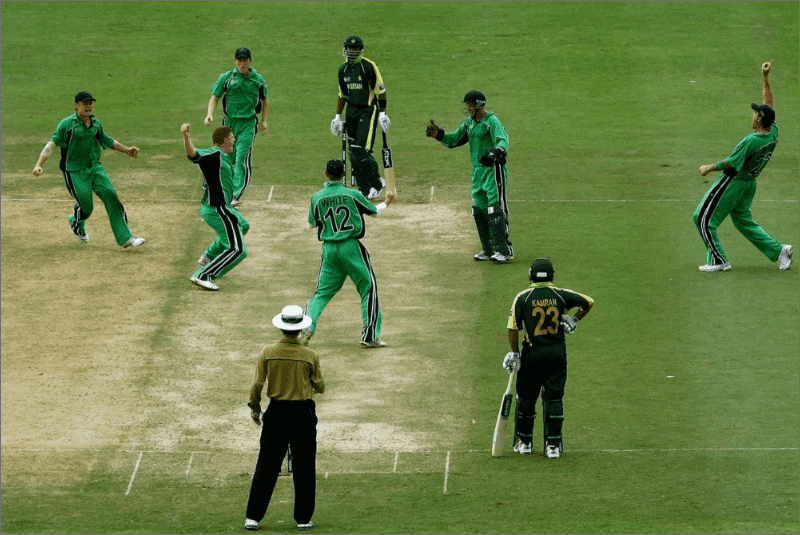
In the 2003 Cricket World Cup, Kenya capitalized on their home advantage to produce a stunning upset by defeating Sri Lanka. New Zealand had opted not to travel to Nairobi for their Pool B fixture due to security concerns, resulting in a forfeiture of points.
However, Sri Lanka did travel to the Gymkhana Club Ground, where they fell victim to Kenya’s biggest one-day win since their famous victory over West Indies in 1996.
Initially, there were no indications of what would come when the home side struggled to post 210 for nine from their 50 overs. However, Sri Lanka’s potent batting lineup found it challenging to cope with Kenya’s bowlers, with leg-spinner Collins Obuya playing a standout role. Obuya claimed five wickets for 24 runs in his ten overs, with key batters like Aravinda de Silva, Mahela Jayawardene, and Kumar Sangakkara among his victims during a superb display of slow bowling.
Sri Lanka was eventually bowled out for 157 runs in 45 overs, securing Kenya’s place in the Super Eight stage with one foot already in. This memorable victory showcased the unpredictable nature of cricket and the impact of playing at home.
5. Ireland vs. Pakistan (Jamaica, 2007)

On St. Patrick’s Day in 2007, Ireland’s cricket team celebrated a momentous victory by stunning Pakistan at Sabina Park in Jamaica.
Pakistan, batting first, was dismissed for a mere 132 runs in 45.4 overs on a pitch that provided some assistance to the seam bowlers. Boyd Rankin, who has since represented England in one-day and Test cricket, played a pivotal role by taking three wickets for 32 runs, with every Irish bowler chipping in.
However, it was Niall O’Brien who played a crucial role in successfully chasing down the revised target of 127 following a rain delay. The wicketkeeper-batsman scored 72 runs (the highest individual score in the match), and without his contribution, Ireland’s victory would have been in jeopardy. He was the fifth wicket to fall with the score at 108, leaving his team in a precarious position.
Nonetheless, Niall’s brother, Kevin O’Brien, and captain Trent Johnston combined to guide Ireland to victory with three wickets to spare. This historic win not only helped Ireland qualify for the Super Eights but also resulted in Pakistan’s unexpected exit from the tournament.
The significance of Pakistan’s defeat, however, was put into perspective when their coach, Bob Woolmer, was tragically found dead in his hotel room the following day.
4. Zimbabwe vs. Australia (Trent Bridge, 1983)
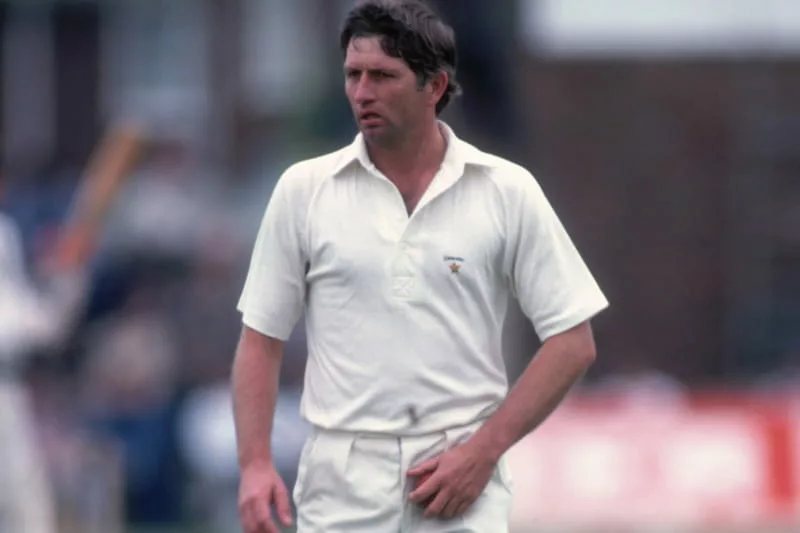
A dramatic debut marked Zimbabwe’s entry into the Cricket World Cup 1983. They opened their campaign against an Australian side featuring cricket legends Dennis Lillee and Jeff Thomson, along with a young Allan Border.
Initially, it appeared the match would follow the expected script when Zimbabwe was reduced to 94 for five at Trent Bridge, Nottingham, England. However, Duncan Fletcher, the team’s captain, led a lower-order recovery, remaining unbeaten with a score of 69 to guide his side to 239 for six in their allotted 60 overs.
Fletcher’s contribution did not end with the bat; he also made an impact with the ball, claiming four wickets for 42 runs. His bowling included breaking an opening stand of 62 runs between Kepler Wessels and Graeme Wood.
Although wicketkeeper Rodney Marsh made an unbeaten 50, Australia fell short of the target, finishing 226 for seven. This defeat was a bitter pill for Australia captain Kim Hughes to swallow, as he later revealed in an interview, expressing his frustration and disbelief at the unexpected loss.
3. Kenya vs. West Indies (Nairobi, 1996)
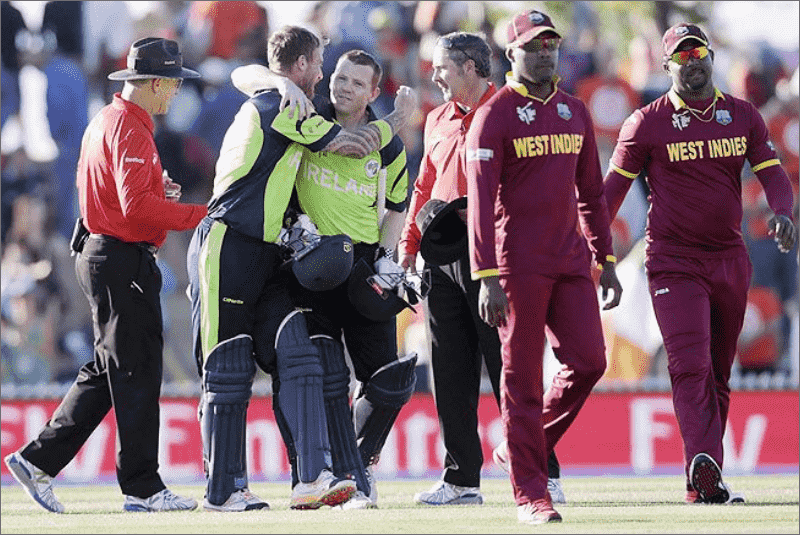
Kenya achieved a stunning victory over the West Indies at the 1996 Cricket World Cup thanks to a brilliant bowling performance.
The underdogs appeared to be in trouble at Nehru Stadium, Poona, India, as they were bowled out for a modest total of 166, with extras being the top scorer at 37.
The West Indies’ recklessness in conceding extras proved crucial, but the main reason for their downfall was their surprisingly poor batting performance against an Associate nation. Only Shivnarine Chanderpaul and Roger Harper reached double figures as the Caribbean team was dismissed for just 93, marking their lowest-ever total in a World Cup fixture.
One of the key wickets for Kenya was the dismissal of Brian Lara, who was caught behind for eight runs, becoming one of the three wickets claimed by Rajab Ali.
However, this upset may not have been such a great surprise after all, as pointed out by Martin Williamson in a review of the game for ESPN Cricinfo. The West Indies struggled when they entered the tournament, and their performance against Kenya indicated their challenges.
“Richie Richardson, the captain, was under immense pressure to step down, and it was widely agreed that he appeared isolated and detached from a team that had lost confidence in his leadership. Adding to the team’s woes, their star player, Brian Lara, occasionally seemed disengaged and uninterested in being part of the team.”
2. Ireland vs. England (Bangalore, 2011)

In the 2011 Cricket World Cup, Ireland showcased their giant-killing abilities, a trait they had demonstrated in the previous World Cup. Despite this, few expected them to upset England.
After defeating the toss and choosing to bat first at the M Chinnaswamy Stadium in Bangalore, India, England amassed 327 for eight, with Jonathan Trott top-scoring with 92.
The loss of wickets continually hampered the Irish response, and they struggled at 111 for five at one point. However, it was Kevin O’Brien who not only shifted the momentum but also created history in the World Cup.
The all-rounder blazed his way to the fastest century in the tournament, achieving this milestone in just 50 deliveries. O’Brien’s explosive innings, featuring six sixes and 13 fours, ended when he was dismissed for 113. However, by that point, the damage had already been done.
John Mooney and Trent Johnston guided Ireland to victory with three wickets to spare in the final over, marking the most successful run chase in a World Cup match. This historic win highlighted Ireland’s prowess as giant killers on the cricketing stage.
1. India vs. West Indies (Lord’s, 1983)
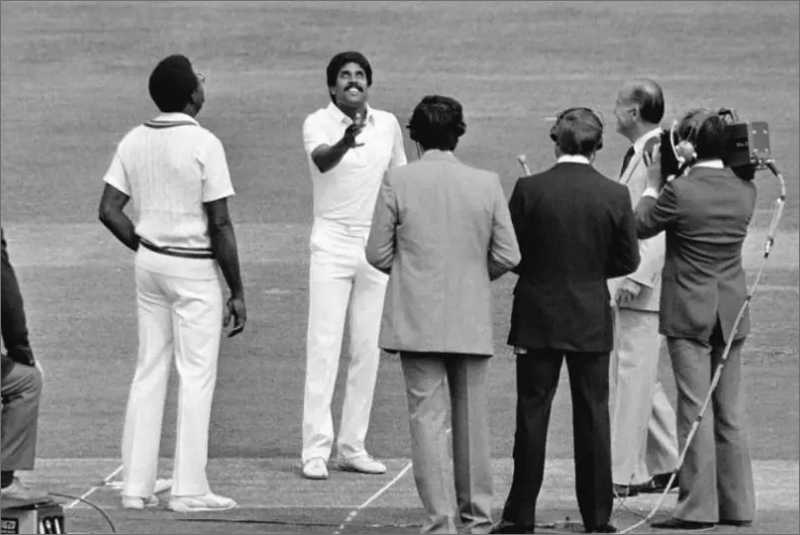
In 1983, India shattered West Indies’ hopes of winning the Cricket World Cup for the third consecutive time. The final at Lord’s showcased a contrast in playing styles, with West Indies relying on four formidable fast bowlers – Andy Roberts, Joel Garner, Malcolm Marshall, and Michael Holding. At the same time, India focused on precision over pace.
India, captained by Kapil Dev, was asked to bat first in the final. While several of their top-order batters made promising starts, they were eventually bowled out for 183 with over five overs to spare.
However, this seemingly modest total proved sufficient to cause a historic upset. West Indies’ run chase began to unravel with the dismissal of Viv Richards. After scoring 33 runs, he miscued a hook shot off the bowling of Madan Lal. Kapil Dev, running back toward the leg-side boundary, managed to hold onto the crucial catch.
Medium-pacer Mohinder Amarnath claimed three of the final four wickets to fall as West Indies was bowled out for 140. This stunning victory had a lasting impact on future generations and the popularity of cricket in India. Sourav Ganguly, who would go on to captain India in Tests and ODIs, emphasized the significance of the 1983 World Cup victory, stating that it opened up new horizons for Indian cricket and inspired countless aspiring cricketers.






